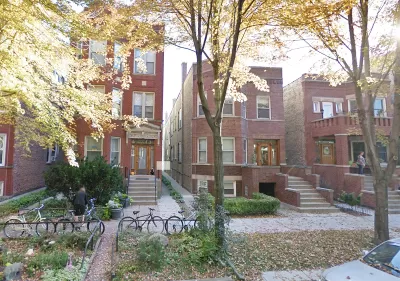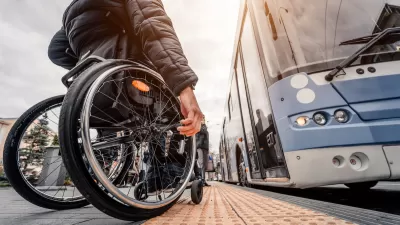A study of Chicago neighborhoods showed that access to urban amenities does not necessarily correlate with improved economic outcomes.

The '15-minute city' has become a popular buzzword for mayors around the world, but new research shows that close proximity to urban amenities does not necessarily correlate with lower poverty rates or more equitable outcomes.
As John Greenfield writes, Doug Bright used a series of maps created by Jeremy Glover that "looked at access to eight different types of destinations: grocery stores, parks, libraries, elementary schools, high schools, hospitals or urgent care centers, pharmacies, and ‘L’ stations" in Chicago to assess the relationship between 15-minute neighborhoods and equity.
[W]hite residents, who are more likely than other groups to live in dense neighborhoods, such as downtown and in the North Lakefront neighborhoods, are overrepresented in the areas that have high levels of access to essential resources. But counterintuitively, [Bright] also determined that 'The highest poverty rate (22%, compared to an 18% city average) is also found at the highest level of access.'
In conclusion, "[a]ny strategies for planning imported (especially in a top-down manner) from other cities, countries, or continents should be regarded with healthy skepticism, as one-size-fits-all approaches are bound to ignore important nuances and autonomy of a place."
The full paper is available here.
FULL STORY: Study: 15-minute walk/bike access to key resources is not enough to guarantee prosperity

Maui's Vacation Rental Debate Turns Ugly
Verbal attacks, misinformation campaigns and fistfights plague a high-stakes debate to convert thousands of vacation rentals into long-term housing.

Planetizen Federal Action Tracker
A weekly monitor of how Trump’s orders and actions are impacting planners and planning in America.

San Francisco Suspends Traffic Calming Amidst Record Deaths
Citing “a challenging fiscal landscape,” the city will cease the program on the heels of 42 traffic deaths, including 24 pedestrians.

Defunct Pittsburgh Power Plant to Become Residential Tower
A decommissioned steam heat plant will be redeveloped into almost 100 affordable housing units.

Trump Prompts Restructuring of Transportation Research Board in “Unprecedented Overreach”
The TRB has eliminated more than half of its committees including those focused on climate, equity, and cities.

Amtrak Rolls Out New Orleans to Alabama “Mardi Gras” Train
The new service will operate morning and evening departures between Mobile and New Orleans.
Urban Design for Planners 1: Software Tools
This six-course series explores essential urban design concepts using open source software and equips planners with the tools they need to participate fully in the urban design process.
Planning for Universal Design
Learn the tools for implementing Universal Design in planning regulations.
Heyer Gruel & Associates PA
JM Goldson LLC
Custer County Colorado
City of Camden Redevelopment Agency
City of Astoria
Transportation Research & Education Center (TREC) at Portland State University
Jefferson Parish Government
Camden Redevelopment Agency
City of Claremont





























